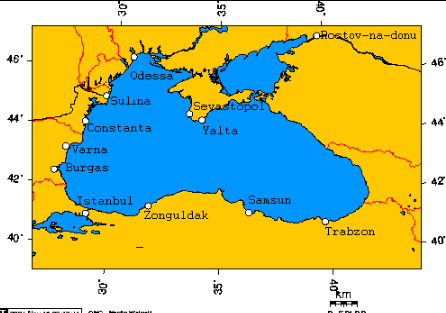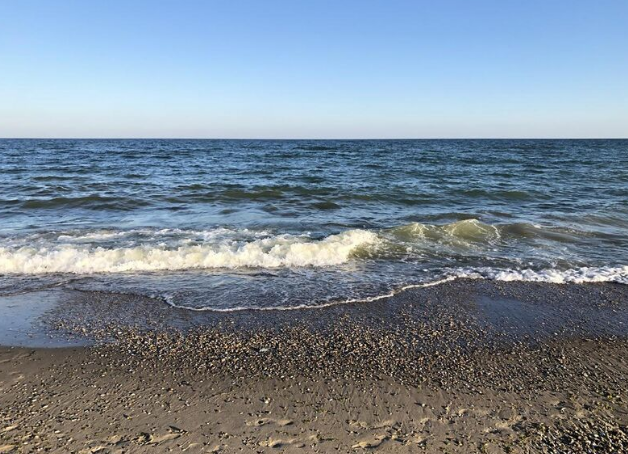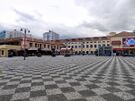
| Version | Summary | Created by | Modification | Content Size | Created at | Operation |
|---|---|---|---|---|---|---|
| 1 | Jason Zhu | -- | 1145 | 2022-10-14 01:37:13 |
Video Upload Options
The Black Sea trade and economy provide an integral part in the connection between Asia and Europe. In addition to sea ports and fishing, key activities include hydrocarbons exploration for oil and natural gas, and tourism. According to NATO, the Black sea is a strategic corridor that provides smuggling channels for moving legal and illegal goods including drugs, radioactive materials, and counterfeit goods that can be used to finance terrorism.
1.1. Ports and Ferry Terminals
According to the International Transport Workers' Federation 2013 study, there were at least 30 operating merchant seaports in the Black Sea (including at least 12 in Ukraine ).[1]
1.2. Merchant Fleet and Traffic
According to the International Transport Workers' Federation 2013 study, there were around 2,400 commercial vessels operating in the Black Sea.[1]
2. Fishing
Anchovy: the Turkish commercial fishing fleet catches around 300,000 tons per year on average, and fishery carried out mainly in winter and the highest portion of the stock is caught between November and December.[2]
3. Hydrocarbons Exploration
Since the 1980s, the Soviet Union started offshore drilling for petroleum in the sea's western portion (adjoining Ukraine 's coast). Independent Ukraine continued and intensified that effort within its exclusive economic zone, inviting major international oil companies for exploration. Discovery of the new, massive oilfields in the area stimulated an influx of foreign investments. It also provoked a short-term peaceful territorial dispute with Romania which was resolved in 2011 by an international court redefining the exclusive economic zones between the two countries.
4. Oil and Natural Gas
The Black Sea contains oil and natural gas resources but exploration in the sea is incomplete. (As of 2017), 20 wells are in place. Throughout much of its existence, the Black Sea has had significant oil and gas-forming potential because of significant inflows of sediment and nutrient-rich waters. However, this varies geographically. For example, prospects are poorer off the coast of Bulgaria because of the large influx of sediment from the Danube which obscured sunlight and diluted organic-rich sediments. Many of the discoveries to date have taken place offshore of Romania in the Western Black Sea and only a few discoveries have been made in the Eastern Black Sea.
During the Eocene, the Paratethys Ocean was partially isolated and sea levels fell. During this time sand shed off the rising Balkanide, Pontide and Caucasus mountains trapped organic material in the Maykop Suite of rocks through the Oligocene and early Miocene. Natural gas appears in rocks deposited in the Miocene and Pliocene by the paleo-Dnieper and pale-Dniester rivers, or in deep-water Oligocene-age rocks. Serious exploration began in 1999 with two deep-water wells, Limanköy-1 and Limanköy-2, drilled in Turkish waters. Next, the HPX (Hopa)-1 deepwater well targeted late Miocene sandstone units in Achara-Trialet fold belt (also known as the Gurian fold belt) along the Georgia-Turkey maritime border. Although geologists inferred that these rocks might have hydrocarbons that migrated from the Maykop Suite, the well was unsuccessful. No more drilling happened for five years after the HPX-1 well. Then in 2010, Sinop-1 targeted carbonate reservoirs potentially charged from the nearby Maykop Suite on the Andrusov Ridge, but the well-struck only Cretaceous volcanic rocks. Yassihöyük-1 encountered similar problems. Other Turkish wells, Sürmene-1 and Sile-1 drilled in the Eastern Black Sea in 2011 and 2015 respectively tested four-way closures above Cretaceous volcanoes, with no results in either case. A different Turkish well, Kastamonu-1 drilled in 2011 did successfully find thermogenic gas in Pliocene and Miocene shale-cored anticlines in the Western Black Sea. A year later in 2012, Romania drilled Domino-1 which struck gas prompting the drilling of other wells in the Neptun Deep. In 2016, the Bulgarian well Polshkov-1 targeted Maykop Suite sandstones in the Polshkov High and Russia is in the process of drilling Jurassic carbonates on the Shatsky Ridge as of 2018.[3]
In August 2020, Turkey found 320 billion cubic metres (11 trillion cubic feet) of natural gas in the biggest ever discovery in the Black Sea, and hoped to begin production by 2023. The Turkish drilling ship Fatih, had been carrying out exploration operations in the Tuna-1 sector in the western Black Sea for the past month. The field is called the Sakarya Gas Field. The sector is near where Romania has also found gas reserves.[4]
5. Coastal and Port Cities on Black Sea Coast, Population and Trade

In the years following the end of the Cold War, the popularity of the Black Sea as a tourist destination steadily increased. Tourism at Black Sea resorts became one of the region's growth industries.[5]
- Black sea coast cities names (Clockwise from Istanbul; Russia* denotes contemporary disputed territories claimed by Ukraine)
- Clock wise country names : Turkey, Bulgaria, Romania, Ukraine, Russia, Georgia
| Contemporary
name/country |
Old & Ottoman
names/Country |
Known for trade/tourism | Geographic
Coordinates |
|
|---|---|---|---|---|
| Istanbul/Turkey |
|
|||
| Ahtopol/Bulgaria | Ahtenbolu/Ottoman Empire | |||
| Burgas/Bulgaria | Ahelo-Pirgas/Ottoman Empire | |||
| Varna/Bulgaria | ||||
| Constanta/Romania | ||||
| Illichivsk/Ukraine | ||||
| Odessa/Ukraine | ||||
| Mykolayiv/Ukraine | ||||
| Chornomorske/Russia* | ||||
| Sevastopol/Russia * | ||||
| Feodosia/Russia* | ||||
| Kerch/Russia* | ||||
| Mariupol/Russia | ||||
| Novorosiysk/Russia | ||||
| Tuapse/Russia | ||||
| Sochi/Russia | ||||
| Sokhumi/Georgia | ||||
| Batumi/Georgia | ||||
| Trabzon/Turkey | Trapezunt//Ottoman Empire | |||
| Samsun/Turkey | ||||
| Sinop/Turkey | ||||
| Zonguldak/Turky | ||||
| Izmit/Turkey | ||||
| Istanbul/Turkey | ||||
The following is a list of notable Black Sea resort towns:

- 2 Mai (Romania)
- Agigea (Romania)
- Ahtopol (Bulgaria)
- Amasra (Turkey)
- Anaklia (Georgia)
- Anapa (Russia)
- Albena (Bulgaria)
- Alupka (Crimea, Ukraine/Russia (disputed))
- Alushta (Crimea, Ukraine/Russia (disputed))
- Balchik (Bulgaria)
- Batumi (Georgia)[6]
- Burgas (Bulgaria)
- Byala (Bulgaria)
- Cap Aurora (Romania)
- Chakvi (Georgia)
- Constantine and Helena (Bulgaria)
- Constanța (Romania)
- Corbu (Romania)
- Costineşti (Romania)
- Eforie (Romania)
- Emona (Bulgaria)
- Eupatoria (Crimea, Ukraine/Russia (disputed))
- Foros (Crimea, Ukraine/Russia (disputed))
- Feodosiya (Crimea, Ukraine/Russia (disputed))
- Giresun (Turkey)
- Gagra (Abkhazia, Georgia[7])
- Gelendzhik (Russia)
- Golden Sands (Bulgaria)
- Gonio (Georgia)
- Gudauta (Abkhazia, Georgia[7]) and subsequently the Gudauta Bay.
- Gurzuf (Crimea, Ukraine/Russia (disputed))
- Hopa (Artvin, Turkey)
- Istanbul (Turkey)
- Jupiter (Romania)
- Kamchia (Bulgaria)
- Kavarna (Bulgaria)
- Kiten (Bulgaria)
- Kobuleti (Georgia)
- Koktebel (Crimea, Ukraine/Russia (disputed))
- Lozenetz (Bulgaria)
- Mamaia (Romania)
- Mangalia (Romania)
- Năvodari (Romania)
- Neptun (Romania)
- Nesebar (Bulgaria)
- Novorossiysk (Russia)
- Ordu (Turkey)
- Obzor (Bulgaria)
- Odessa (Ukraine)
- Olimp (Romania)
- Pitsunda (Abkhazia, Georgia[7])
- Pomorie (Bulgaria)
- Primorsko (Bulgaria)
- Rize (Turkey)
- Rusalka (Bulgaria)
- Samsun (Turkey)
- Saturn (Romania)
- Sinop (Turkey)
- Sochi (Russia)
- Sozopol (Bulgaria)
- Sudak (Crimea, Ukraine/Russia (disputed))
- Skadovsk (Ukraine)
- Sulina (Romania)
- Sunny Beach (Bulgaria)
- Şile (Turkey)
- Sveti Vlas (Bulgaria)
- Trabzon (Turkey)
- Tsikhisdziri (Georgia)
- Tuapse (Russia)
- Ureki (Georgia)
- Vama Veche (Romania)
- Varna (Bulgaria)
- Venus (Romania)
- Yalta (Crimea, Ukraine/Russia (disputed))
- Zonguldak (Turkey)
6. Population
Most populous urban areas along the Black Sea coastline

Istanbul Odessa |
Rank | City | Country | Region/County | Population (urban) | 
Samsun Constanța |
|---|---|---|---|---|---|---|
| 1 | Istanbul | Istanbul | 14,324,240[8] | |||
| 2 | Odessa | Odessa | 1,003,705 | |||
| 3 | Samsun | Samsun | 535,401[9] | |||
| 5 | Varna | Varna | 500,076 | |||
| 4 | Constanța | Constanța | 491,498[10] | |||
| 6 | Sevastopol | disputed: |
Federal city / City with special status | 379,200 | ||
| 7 | Sochi | Krasnodar Krai | 343,334 | |||
| 8 | Trabzon | Trabzon | 305,231[11] | |||
| 9 | Novorossiysk | Krasnodar Krai | 241,952 | |||
| 10 | Burgas | Burgas | 223,902[12] | |||
| 11 | Ordu | Ordu | 217,640 | |||
| 12 | Batumi | Adjara | 204,156[13] |
References
- "Черное море признано одним из самых неблагоприятных мест для моряков". International Transport Workers' Federation. BlackSeaNews. 27 May 2013. http://www.blackseanews.net/read/64439.
- Turkish Black Sea Acoustic Surveys: Winter distribution of anchovy along the Turkish coast Serdar SAKINAN. Middle East Technical University – Institute of Marine Sciences http://hamsi.ims.metu.edu.tr/sunumlar/6-Anchovy_Medias_2013.pdf
- Simmons, Tari & Okay 2018, p. 10-12.
- Selcan Hacaoglu, Vanessa Dezem, Cagan Koc (21 August 2020). "Erdogan Unveils Biggest Ever Black Sea Natural Gas Discovery". Bloomberg News. https://www.bloomberg.com/amp/news/articles/2020-08-21/all-eyes-on-erdogan-as-reports-of-black-sea-energy-find-mount.
- "Bulgarian Sea Resorts". http://www.bulgariansearesorts.com.
- Postcard from the Silk Road – Batumi...(http://www.znadwiliiwilno.lt/wp-content/uploads/2020/04/Znad-Wilii-57m.pdf
- Abkhazia is a partially-recognized nation, de facto independent since 1993, though still claimed by Georgia as one of its provinces.
- "Turkish Statistical Institute". Rapor.tuik.gov.tr. http://rapor.tuik.gov.tr/reports/rwservlet?adnksdb2&ENVID=adnksdb2Env&report=wa_turkiye_ilce_koy_sehir.RDF&p_il1=34&p_kod=1&p_yil=2011&p_dil=1&desformat=html.
- "Turkish Statistical Institute". Rapor.tuik.gov.tr. http://rapor.tuik.gov.tr/reports/rwservlet?adnksdb2&ENVID=adnksdb2Env&report=wa_turkiye_ilce_koy_sehir.RDF&p_il1=55&p_kod=1&p_yil=2011&p_dil=1&desformat=html.
- "Cât a crescut populația în principalele zone metropolitane ale țării în ultimele două decenii". http://www.analizeeconomice.ro/2016/03/cat-crescut-populatia-in-principalele.html.
- "Turkish Statistical Institute". Rapor.tuik.gov.tr. http://rapor.tuik.gov.tr/reports/rwservlet?adnksdb2&ENVID=adnksdb2Env&report=wa_turkiye_ilce_koy_sehir.RDF&p_il1=61&p_kod=1&p_yil=2011&p_dil=1&desformat=html.
- "Turkish Statistical Institute". Rapor.tuik.gov.tr. http://rapor.tuik.gov.tr/reports/rwservlet?adnksdb2&ENVID=adnksdb2Env&report=wa_turkiye_ilce_koy_sehir.RDF&p_il1=67&p_ilce1=1741&p_kod=2&p_yil=2011&p_dil=1&desformat=html.
- "Batumi City Hall website". http://www.batumi.ge/en/.






